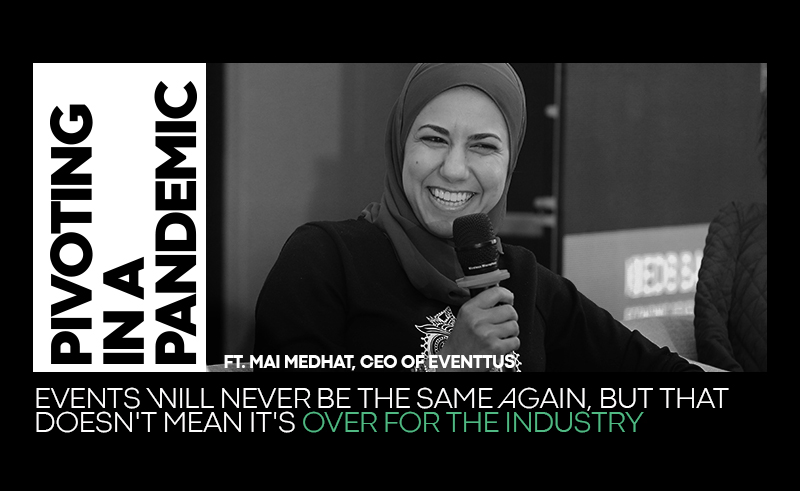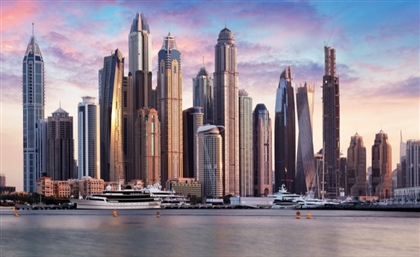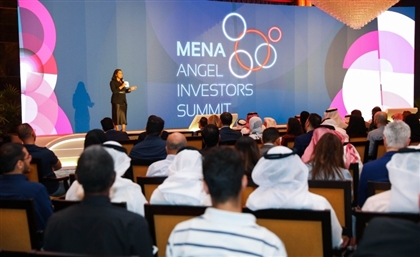PIVOTING IN A PANDEMIC: Events Will Never Be the Same Again, But That Doesn't Mean It's Over
In the second edition of our series focusing on the entrepreneurs that are reacting quickly and agilely to the global pandemic, we speak to Mai Medhat, CEO of Eventtus, about how the tech company is leading the change that’s bound to come.

At first glance, it might seem that the events industry is doomed. Organisers, sponsors, production companies, supporting tech - all must be going the way of the dodo, at least for now. It’s an industry built on bringing massive amounts of peoples together. Of course a pandemic would make the whole scheme at least temporarily obsolete.
How then, did Eventtus, leading Egyptian event engagement platform and events app (headquartered in Dubai), manage to raise multi-investor funding now? When most entrepreneurs are either still scrambling, or have settled into bare-bones survival mode — and investors are understandably wary, as the full scale of the crisis is yet to be revealed — how did Eventtus raise an undisclosed amount from Algebra Ventures, Hala Ventures, and DAAL VC?
Late last month, when most of us had just barely started working from home, Eventtus launched a partnership with media production company Sawarly to launch virtual events. Now, their impromptu funding round will enable them to launch a fully integrated virtual events product that, as CEO Mai Medhat describes it, goes far beyond simple live-streaming.
If everyone’s thinking in the same direction - purely in survival mode - we need to think differently, what other people might be ignoring: how can we innovate our way out of this?
“During crises, there are companies who blame the market for their own failures, and those who use the market’s failure to make their own success,” said Ali Abussaud, Hala Ventures Founder and Managing Partner, about the investment. “We believe that Eventtus belongs to the latter and thus we decided to invest in them during such a critical crisis.”
Since its launch in 2012 in Cairo, Eventtus has expanded its offices to Dubai and Riyadh, and operated in 15 countries. It’s been the tech behind the region’s biggest conferences, including RiseUp and the StepConference. We caught up with co-founder and CEO Mai Medhat to talk about what she sees as the irrevocable future of events, and what it means for the industry.
This isn’t a survival feature for us. It’s a whole new product line that we will be focused on for good. It’s here to stay.
What was your immediate reaction when all of this started happening? Was the world crashing in?
We were lucky enough to see it coming a little early, around mid-February when a lot of our international events began to get postponed. And we were in denial for a while, thinking, ‘okay, Ramadan is low season anyway, there aren’t many conferences and business events, maybe the low season just started a month early.’ But then, no, this is real, and this isn’t ending anytime soon.
Immediately, even before this funding, my team thought of partnering up with media production company Sawarly to have events go virtual. And the number of leads we got that week is actually beyond what we got in the past three months, because everyone’s trying to figure out what to do with their events.
And then we realised: this will become the new norm. The whole world is using virtual tools, even governments. And this is massively accelerating the adoption of technology. So even when events are back, which won’t be for a while, people will have adapted to a different world out there, so a new type of events will emerge. The new norm will be hybrid events, part virtual, part physical.
During crises, there are companies who blame the market for their own failures, and those who use the market’s failure to make their own success.
What can you tell me about the new product you’re launching now?
We won’t be mirroring what’s happening offline onto virtual events, because the behaviour isn’t the same. No one’s going to sit in front of their laptop for 8-9 hours like we used to go to all-day events from 8AM until 6PM, that’s not happening. People don’t act online the way they do in person, so we’re really studying user behaviour to better cater the product to people’s actual experience of virtual events.
Events are more than just their content; there’s the need for branding, networking, the flow that people go through from the second they walk through the gate, all those chance encounters that lead to connections. We can’t replicate it exactly online, but we can offer similar experiences.
It’s very hard to explain what the experience will look like, but it’ll include opportunities for branding that Zoom for example doesn’t provide, networking hubs and virtual lounges, different chatrooms organised by topic so you can meet a large pool of people, multiple stages, our Q&A process that you would have seen at RiseUp in the past, a lot of interactive functionality, full integration with our ticketing process, and a lot of sponsorship opportunities, because we know that’s very important to our clients.
We want to go with a very early launch in two weeks, on-boarding a few of our existing customers. And then we’ll be adding more features and functionality as we go. We’ll be learning and adapting based on what the data tells us.
No one’s going to sit in front of their laptop for 8-9 hours like we used to go to all-day events from 8AM until 6PM, that’s not happening.
Why do you think you were able to pull off, not just a new product, but an investment that shows faith in that product, when many people are still scrambling?
I think our biggest advantage was how quickly we moved. Our events, our entire business, were suddenly on hold, but as a team, we were all in the mindset that this is not the time to get depressed. It’s not that time.
Our competitors are global, and even in the UK and US, we were the first in the market to address the situation and come up with a solution like we did with Sawarly, to try and innovate to support our customers.
And then we thought, if everyone’s thinking in the same direction - purely in survival mode - we need to think differently. We need to think of what other people might be ignoring, which is: how can we innovate our way out of this?
Events will be the last thing to come back [after everything returns to normal.] It might not be for 12 or 18 months, but it will come back.
What does this mean on the business side of things? How sustainable is the model you’re working with now if, as you’ve mentioned, events won’t be back for a while?
We really sank into the mindset of pivoting: what can we do now that can become a new business model for Eventtus, something that we can sustain and use to even massively increase profits down the line?
So this isn’t a survival feature for us. It’s a whole new product line that we will be focused on for good. It’s here to stay.
You’ve said it could be a long, long time before events are back, when do you think that could be?
With events, there’s a huge responsibility on the organisers and speakers and sponsors. No one wants to be the person who organised a huge event that becomes a hub for infection, and people get sick because of you.
That’s why events will be the last thing to come back. Everyone’s going to go back to work and regain social lives and everything, but big gatherings and events will have to wait.
But there’s no doubt it will come back. Maybe not soon, maybe in 12 to 18 months, but it will come back.
The business model of events and conferences will change, and we want to lead that change.
What do you think the future of events will look like? Are we ever going to go back to the sprawling industry we saw before, the massive international events?
When we’re back, people will have become used to the digital realm and virtual events. As a company, we’re not letting go of the physical events component of our business, because at some point, the two products will meet.
There will be a new hybrid type of events, part virtual, part physical. An important point is that, especially for the big events, the number of attendees won’t be the same as before, partly because some people will still be scared of large gatherings, and partly because international attendance will see a severe drop.
And so it will be a new norm to offer a virtual part of the event, so as to reach the maximum number of people we used to reach before. And that’s where the strength of our new product comes in, that we’re doing a mix between the virtual and the physical.
Even in the darkest time for all of us, we were able to...innovate, think out of the box, raise money. And actually convince investors to get on board, at a time when most people don’t want to invest.
So we’re talking about a critical juncture for everyone working in events, not just a pivot that a few entrepreneurs can pull off. Where do you see yourself in this revamping of the industry?
Everyone in the events industry is still shocked, we’re all trying to understand and come up with new solutions. And that includes entertainment professionals, concert organisers and musicians, all the way to the big conferences and exhibitions.
One of the reasons that we shared the announcement is to boost the morale of the whole industry and the whole ecosystem. That even in the darkest time for all of us, we were able to do this: innovate, think out of the box, raise money. And actually convince investors to get on board, at a time when most people don’t want to invest, and want to wait things out until the landscape is clearer.
In 12 or 18 months, when events are back, it will not be the same. The business model of events and conferences will change, and we want to lead that change.






















